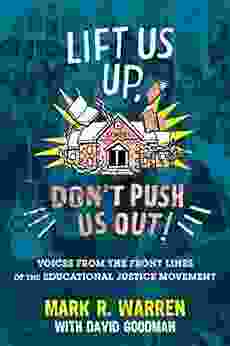Lift Us Up, Don't Push Us Out: Empowering Marginalized Communities Through Equitable Urban Development


Urban development has the potential to transform cities into vibrant, equitable, and sustainable places. However, all too often, it has led to the displacement and marginalization of low-income communities and communities of color. This is because traditional approaches to urban development have prioritized profit over people, leading to the construction of luxury housing, displacement, and the destruction of affordable housing and community spaces.
4.4 out of 5
| Language | : | English |
| File size | : | 3092 KB |
| Text-to-Speech | : | Enabled |
| Screen Reader | : | Supported |
| Enhanced typesetting | : | Enabled |
| Word Wise | : | Enabled |
| Print length | : | 216 pages |
The movement for equitable urban development seeks to challenge these harmful practices and create cities that work for everyone. This movement is rooted in the belief that all people, regardless of their race, income, or background, deserve to live in safe, healthy, and affordable communities. Equitable urban development is about more than just building affordable housing. It's about creating inclusive communities where all residents have access to the same opportunities and resources.
This article will explore the principles of equitable urban development and provide examples of how it can be put into practice. We will also discuss the challenges that the movement faces and the ways that we can overcome them.
Principles of Equitable Urban Development
There are a number of key principles that guide equitable urban development. These principles include:
- Community engagement: Residents should be actively involved in all aspects of the planning and implementation of urban development projects. This ensures that their needs and concerns are taken into account.
- Affordable housing: All residents should have access to safe, healthy, and affordable housing. This means preserving existing affordable housing, building new affordable housing, and providing financial assistance to low-income households.
- Economic opportunity: Residents should have access to good jobs, job training, and other economic opportunities. This means investing in job creation, supporting small businesses, and developing workforce training programs.
- Environmental justice: All residents should have access to clean air, clean water, and a healthy environment. This means reducing pollution, investing in green infrastructure, and protecting natural resources.
- Racial justice: Urban development should address the historical and ongoing racism that has led to the displacement and marginalization of communities of color. This means investing in policies and programs that promote racial equity, such as reparations, affordable housing, and community development.
Examples of Equitable Urban Development
There are a number of examples of how equitable urban development has been put into practice. Here are a few examples:
- The Community Land Trust (CLT) model: CLTs are nonprofit organizations that acquire land and make it available to low-income households and community groups for affordable housing and other community development purposes. CLTs help to preserve affordable housing, promote community ownership, and prevent displacement.
- Transit-oriented development (TOD): TOD is a type of development that is located near public transit stations. TOD promotes walkability, reduces traffic congestion, and makes it easier for residents to access jobs, education, and other amenities. TOD can also help to revitalize neighborhoods and create more vibrant communities.
- Community benefits agreements (CBAs): CBAs are legally binding agreements between developers and community groups that ensure that development projects benefit the surrounding community. CBAs can be used to secure affordable housing, job creation, environmental protections, and other community benefits.
Challenges to Equitable Urban Development
The movement for equitable urban development faces a number of challenges, including:
- Profit-driven development: The traditional approach to urban development has prioritized profit over people. This has led to the construction of luxury housing, displacement, and the destruction of affordable housing and community spaces.
- Racism and discrimination: Racism and discrimination have historically led to the exclusion of communities of color from urban development. This has resulted in segregated neighborhoods, unequal access to housing, and environmental injustice.
- Lack of political will: Many politicians are unwilling to challenge the status quo and support policies that promote equitable urban development. This is often because they are beholden to powerful real estate interests that profit from displacement and gentrification.
- Lack of funding: Equitable urban development requires significant investment. However, government funding for affordable housing and other community development programs has been declining in recent years.
Overcoming the Challenges
Despite the challenges, there are a number of ways that we can overcome them and create more equitable cities. Here are a few strategies:
- Organize and mobilize: The first step to overcoming the challenges to equitable urban development is to organize and mobilize. This means building coalitions between community groups, elected officials, and other allies. We need to make our voices heard and demand change.
- Support policies that promote equity: We need to support policies that promote equitable urban development, such as rent control, inclusionary zoning, and community benefits agreements. We also need to elect officials who are committed to equity and justice.
- Invest in affordable housing: We need to invest in the creation and preservation of affordable housing. This means increasing funding for affordable housing programs and providing tax incentives to developers who build affordable housing.
- Challenge racism and discrimination: We need to challenge racism and discrimination in all its forms. This means fighting for policies that promote racial equity, such as reparations, affordable housing, and community development.
- Educate and raise awareness: We need to educate ourselves and others about the importance of equitable urban development. We need to raise awareness of the challenges that marginalized communities face and the solutions that we can implement to create more just and equitable cities.
Equitable urban development is essential for creating cities that are just, sustainable, and prosperous. We need to challenge the harmful practices that have led to the displacement and marginalization of low-income communities and communities of color. We need to create inclusive communities where all residents have access to the same opportunities and resources. We can overcome the challenges and create more equitable cities if we organize, mobilize, and support policies that promote equity.
Let's lift each other up and create cities that we can all be proud of.
4.4 out of 5
| Language | : | English |
| File size | : | 3092 KB |
| Text-to-Speech | : | Enabled |
| Screen Reader | : | Supported |
| Enhanced typesetting | : | Enabled |
| Word Wise | : | Enabled |
| Print length | : | 216 pages |
Do you want to contribute by writing guest posts on this blog?
Please contact us and send us a resume of previous articles that you have written.
 Top Book
Top Book Novel
Novel Fiction
Fiction Nonfiction
Nonfiction Literature
Literature Paperback
Paperback Hardcover
Hardcover E-book
E-book Audiobook
Audiobook Bestseller
Bestseller Classic
Classic Mystery
Mystery Thriller
Thriller Romance
Romance Fantasy
Fantasy Science Fiction
Science Fiction Biography
Biography Memoir
Memoir Autobiography
Autobiography Poetry
Poetry Drama
Drama Historical Fiction
Historical Fiction Self-help
Self-help Young Adult
Young Adult Childrens Books
Childrens Books Graphic Novel
Graphic Novel Anthology
Anthology Series
Series Encyclopedia
Encyclopedia Reference
Reference Guidebook
Guidebook Textbook
Textbook Workbook
Workbook Journal
Journal Diary
Diary Manuscript
Manuscript Folio
Folio Pulp Fiction
Pulp Fiction Short Stories
Short Stories Fairy Tales
Fairy Tales Fables
Fables Mythology
Mythology Philosophy
Philosophy Religion
Religion Spirituality
Spirituality Essays
Essays Critique
Critique Commentary
Commentary Glossary
Glossary Bibliography
Bibliography Index
Index Table of Contents
Table of Contents Preface
Preface Introduction
Introduction Foreword
Foreword Afterword
Afterword Appendices
Appendices Annotations
Annotations Footnotes
Footnotes Epilogue
Epilogue Prologue
Prologue Lauren Lee Merewether
Lauren Lee Merewether Chandra Priya
Chandra Priya Nic Tatano
Nic Tatano Michelle Tam
Michelle Tam Nathan Clark
Nathan Clark Grant Faulkner
Grant Faulkner Dorothy Porter
Dorothy Porter Quiana
Quiana Norman Maclean
Norman Maclean Kahil Cole
Kahil Cole Betty Neels
Betty Neels Andre Norton
Andre Norton Valerio De Sanctis
Valerio De Sanctis Leigh James
Leigh James Sylvie Stewart
Sylvie Stewart S M Porter
S M Porter Amy Leigh Strickland
Amy Leigh Strickland Joe Bronski
Joe Bronski Booth Tarkington
Booth Tarkington Kara Grand
Kara Grand
Light bulbAdvertise smarter! Our strategic ad space ensures maximum exposure. Reserve your spot today!

 Ismael HayesDragon Ball Super Vol. 8: Last Chance For Hope - A Journey of Redemption and...
Ismael HayesDragon Ball Super Vol. 8: Last Chance For Hope - A Journey of Redemption and... Victor TurnerFollow ·9.2k
Victor TurnerFollow ·9.2k Ed CooperFollow ·2.8k
Ed CooperFollow ·2.8k Miguel NelsonFollow ·18.3k
Miguel NelsonFollow ·18.3k Arthur C. ClarkeFollow ·17.3k
Arthur C. ClarkeFollow ·17.3k Sean TurnerFollow ·6.8k
Sean TurnerFollow ·6.8k Boris PasternakFollow ·5.4k
Boris PasternakFollow ·5.4k Demetrius CarterFollow ·7.7k
Demetrius CarterFollow ·7.7k Earl WilliamsFollow ·16.3k
Earl WilliamsFollow ·16.3k

 Bob Cooper
Bob CooperThe Fading Flower and Swallowing the Sun: Unveiling the...
"The Fading Flower and...

 Jesus Mitchell
Jesus MitchellLa Danza by Rossini: A Captivating Work for Flute Quartet
La Danza is a captivating composition for...

 Ivan Turgenev
Ivan TurgenevThe Never King: Vicious Lost Boys - A Dark and Twisted...
In the realm of Neverland, where shadows dance...

 Herb Simmons
Herb SimmonsThe Stone of Inheritance: Unraveling the Mysteries of a...
A Legacy of Enigmas In the annals of history,...
4.4 out of 5
| Language | : | English |
| File size | : | 3092 KB |
| Text-to-Speech | : | Enabled |
| Screen Reader | : | Supported |
| Enhanced typesetting | : | Enabled |
| Word Wise | : | Enabled |
| Print length | : | 216 pages |














